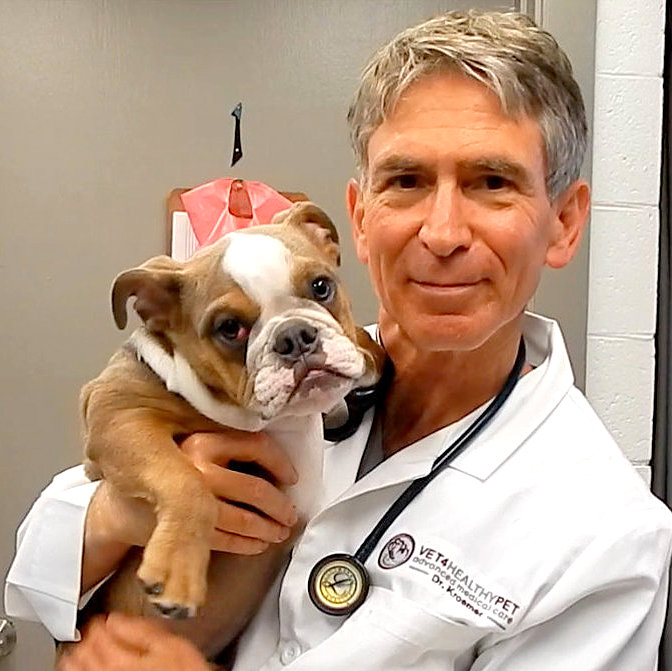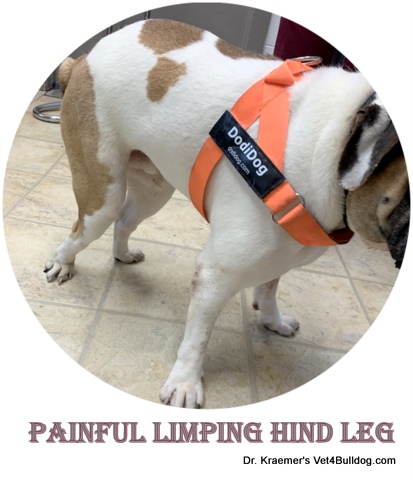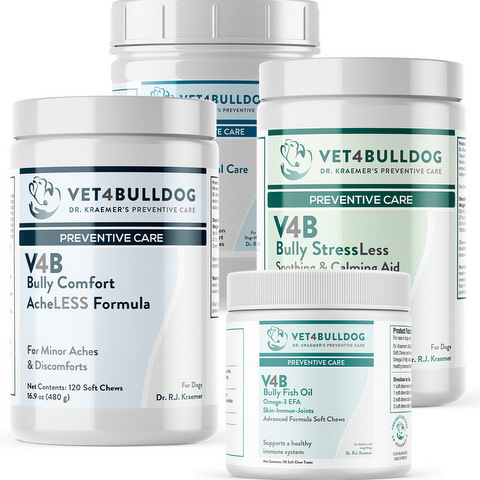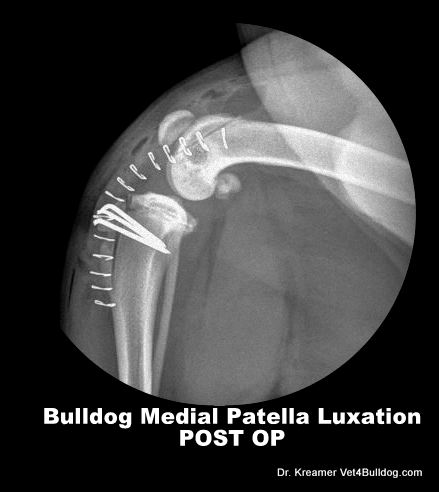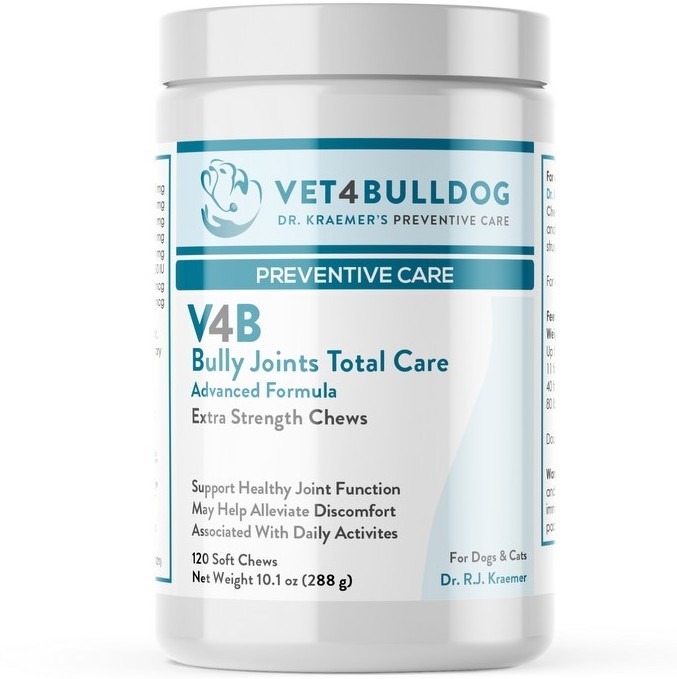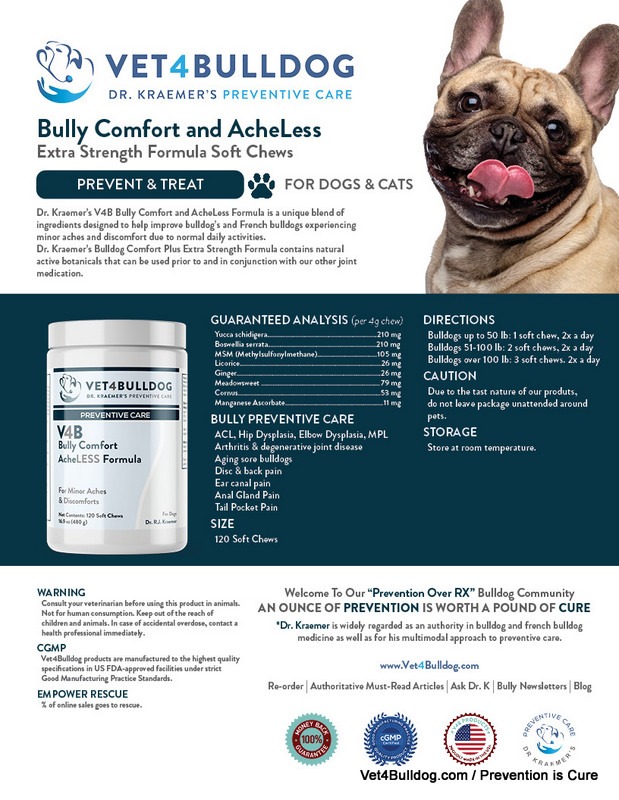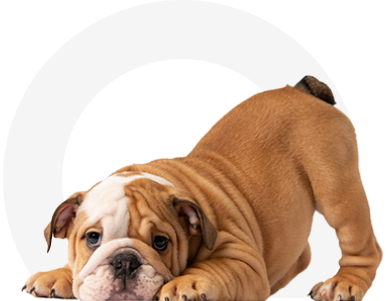Limping is a frequent concern in Bulldogs and French Bulldogs, often beginning at a young age. Hind leg limping is more common than front leg limping and can stem from various causes, including […]
Limping is a frequent concern in Bulldogs and French Bulldogs, often beginning at a young age.
Hind leg limping is more common than front leg limping and can stem from various causes, including
- trauma
- neurological issues
- orthopedic conditions
- and back problems.
Preventing Bulldog and Fr. Bulldog Orthopedic Problems
Many cases of limping can be mitigated through proactive measures such as
- ➡️ Maintaining a healthy weight
- ➡️ Ethical breeding practices
- ➡️Proper nutrition
- ➡️ Joint & back therapeutic bully supplements.

The 3x Leading Causes of Limping in Bulldogs and French Bulldogs
The three most common lamenesses in bulldogs are associated with the hind leg, hip, and knee joints
#1. BULLDOG ACL TEAR
ACL (Anterior Cruciate Ligament) injuries are one of the most common reasons Bulldogs experience hind leg limping.
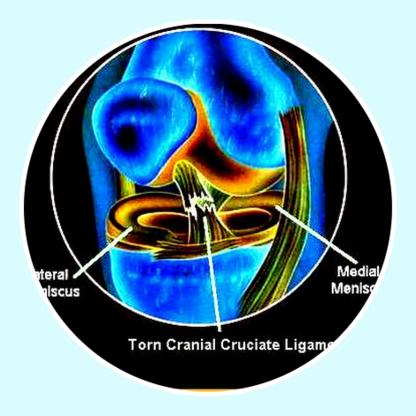
WHAT CAUSES BULLDOG ACL TEAR❓
ACL injuries are especially prevalent in Bulldogs due to their
- short legs relative to their body size
- predisposition to medial patella luxation (dislocated kneecap)
- Occasional hip dysplasia
Other contributing factors include:
- excessive inward rotation of the tibia
- a steep tibial slope
- compressed space between the femur and tibia.
PARTIAL TEAR vs. RAPTURED ACL 🚨
ACL injuries may be partial or complete. However, even partial tears cause inflammation, leading to the accumulation of synovial fluid and toxic byproducts.
Bulldod Knee Arthritis
Over time, these changes result in irreversible arthritis, chronic pain, and an increased likelihood of tears in both the injured and opposite knees due to overcompensation.
HOW TO DIAGNOSE ACL TEAR❓
The diagnosis typically involves a physical exam and radiographs
- Limping
- non-weight-bearing
- Toe touching
- Pain and reluctance to move
WHAT IS THE IDEAL ACL TREATMENT❓
The gold standard for treatment is TPLO (Tibial Plateau Leveling Osteotomy) surgery.

HOW TO PREVENT ACL INJURY❓
To support recovery and prevent future injuries, veterinarians recommend:
- Weight control
- Laser therapy
- Physiotherapy
- Regenerative treatments like stem cell therapy or PRP (Platelet-Rich Plasma)
- Therapeutic Bully supplements
ACL THERAPEUTIC SUPPLEMENTS
Delaying treatment often exacerbates arthritis and increases the risk of injury to the opposite leg.
🩺To learn more about Bulldog ACL, click HERE
#2 Bulldog Medial Patella Luxation (MPL)
The patella, or kneecap, is a small, dome-shaped bone that aids smooth knee joint movement and enhances the function of the quadriceps muscle group.
In Bulldogs, medial patella luxation (MPL) occurs when the kneecap slips out of its groove, typically toward the inner side of the knee.
WHAT ARE MPL SYMPTOMS❓
- Joint instability
- Pain
- A “skipping” gait
- Clicking sounds during movement
- Lameness and abnormal posture
- Increased risk of arthritis and ACL injuries.
BULLDOG MPL DIAGNOSIS:
MPL is diagnosed and graded during a physical exam and with radiographs.

MPL TREATMENT
There are four grades of MPL, with Grade 4 being the most severe.
MPL Grades 3-4 require surgical correction.
HOW TO PREVENT MPL❓
Preventive measures include
- weight management
- limiting jumping and stair use
- Bully therapeutic Joint supplements
🩺To learn more about Bulldog MPL, click HERE
#3 Bulldog and French Bulldog Hip Dysplasia
Hip dysplasia is a common orthopedic condition in Bulldogs and French Bulldogs, often without obvious clinical signs. It is frequently diagnosed incidentally during radiographs.
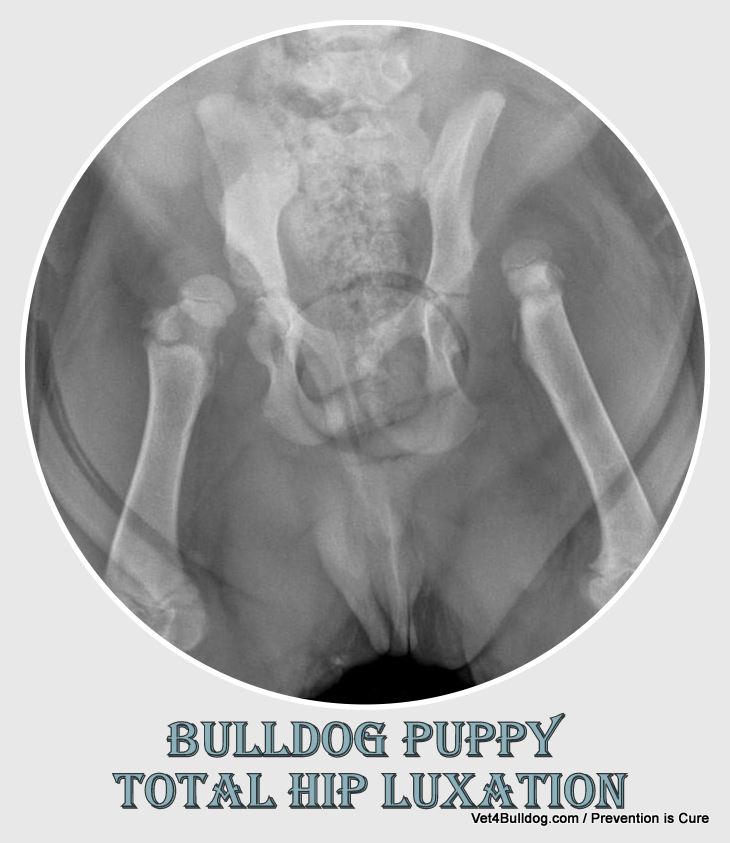
BULLDOG HIP DYSPLASIA SYMPTOMS
- Hip joint laxity
- A “belly dancer” gait with swaying hip motion. 🕺
- “Frog sitting” with the legs spread outward. 🐸
HOW TO PREVENT & TREAT BULLDOG HIP DYSPLASIA❓
Unlike large breeds that often require surgical correction, Bulldogs with hip dysplasia are usually managed with:
- Weight control
- Controlled exercise
- A balanced diet
- Joint & Bone Therapeutic Bully Supplements
🩺To learn more about Bulldog HIP DYSPLASIA, click HERE
Other Causes of Limping in Bulldogs
- ➡️ Front Leg lameness: elbow dysplasia
- ➡️ Back, disc, and vertebral lameness: Issues such as
- ➡️ Osteoarthritis: Typically seen in older Bulldogs.
Lameness in Bulldogs and French Bulldogs: Summary
🩺For Bulldogs exhibiting limping or mobility issues, early diagnosis and appropriate preventive treatment are crucial for ensuring a better quality of life.

~Trusted by Vets ~ Recommended by Owners ~ Loved by Bulldogs
The information provided on this platform is for general informational purposes only. It is not intended as a substitute for professional medical advice, diagnosis, or treatment. Always seek the advice of your veterinarian regarding any medical condition. It's important to always consider professional medical advice promptly and not to delay seeking it based on information you've read on this platform. Any reliance on the information provided here is entirely at your discretion.



